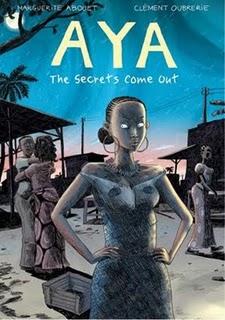Aya: The Secrets Come Out (Volume Three)

Last summer, in dire need of some pure escapism, I stumbled upon the four-volume Aya comic book series. Inspired by author Marguerite Abouet’s childhood, this series takes us back to the late 1970s on the Ivory Coast to a suburb of Abidjan, Yopougon, known affectionately as Yop City to its residents. What initially piqued my interest was finding a series taken from the point of view of Aya, a nineteen-year-old African woman—indeed a rare occurrence. Although the bright and studious Aya is the main character, the storyline revolves around the lives of three Yop city families: Aya’s and those of her two friends, Bintou and Adjoua.
Aya is different from her friends. She is serious and plans to become a doctor, while her friends prefer the nightlife of the maquis, a type of outdoor restaurant and dance bar. Aya is a friend to many in her community. She empowers the powerless, but also puts her friends in their place when they need it. Aya is not perfect, and her family has its share of problems.
In The Secrets Come Out, the third volume of the series, the mistress of Aya’s father stirs the pot when she arrives unannounced on his doorstep with two additional little surprises. Aya is deeply ashamed of her father’s behaviour and begs her mother to teach the wayward Ignace a lesson. This event is quickly overshadowed by the announcement of the skinny and bespectacled Koffi, Bintou's father, that he is going to take a second wife the same age as his daughter. His news creates an uproariously funny fallout in the community. Of the four volumes, The Secrets Come Out is by far the most humorous.
Instead of concentrating on the various scourges that plague Africa, the Aya series presents the quickly changing fortunes of people living on the Ivory Coast, and there are also a few bonus features at the back of the book to get you better acquainted with some of the customs, recipes, and lingo used there. We see an Africa replete with intrigue, beauty, and humour. The Yop City of the late 1970s mirrors many of the same social issues that we were dealing with ourselves at the time in North America: homosexuality, infidelity and the changing roles of women. As for polygamy, although it is illegal, we can’t forget that it is practiced in North America.
Although the story of Aya will draw you in, it is the panels by Clément Oubrerie that gives this series its pure escapism. Not only are his drawings good, but his choice of colours are exceptional. I particularly enjoyed the range of blues and violets that he used for the night scenes. This is an excellent translation from the original French series.